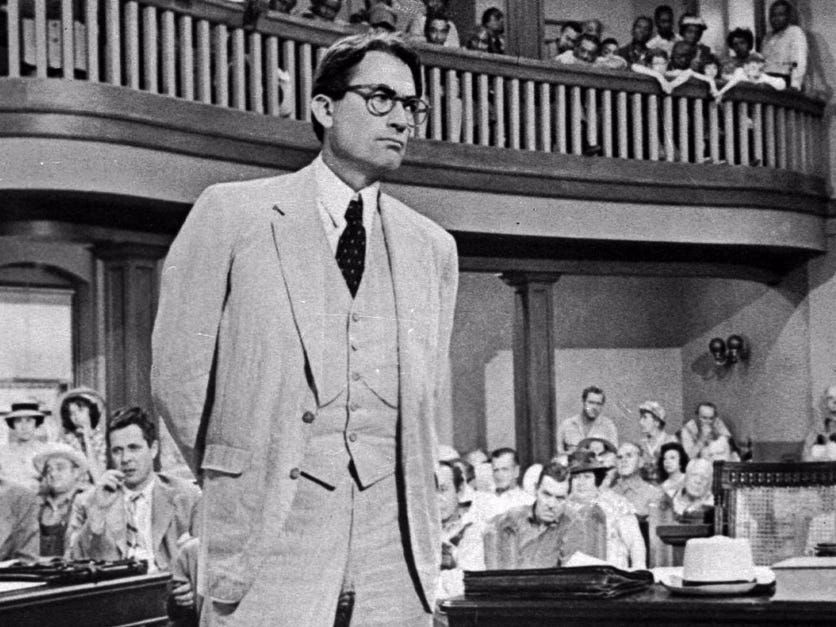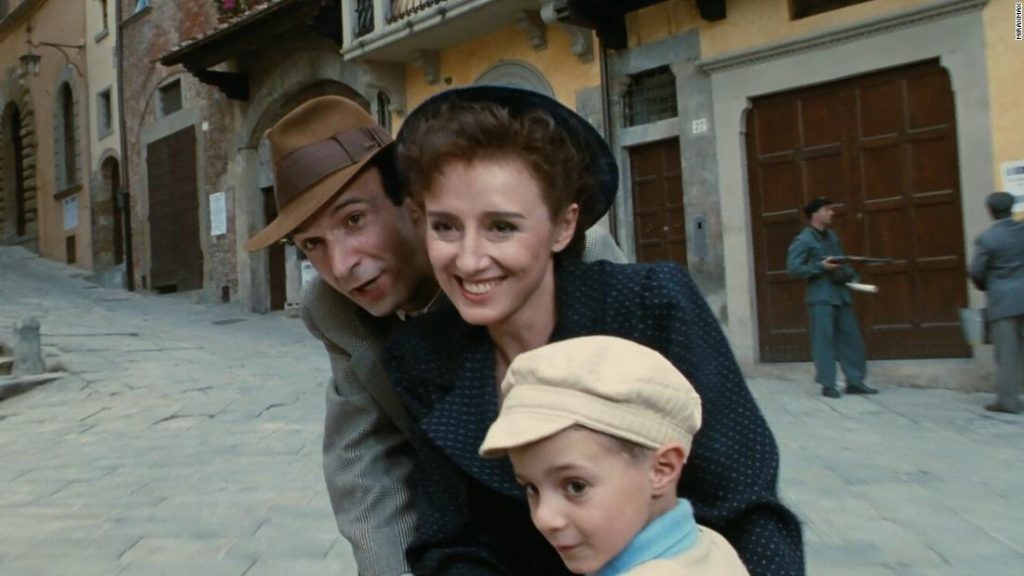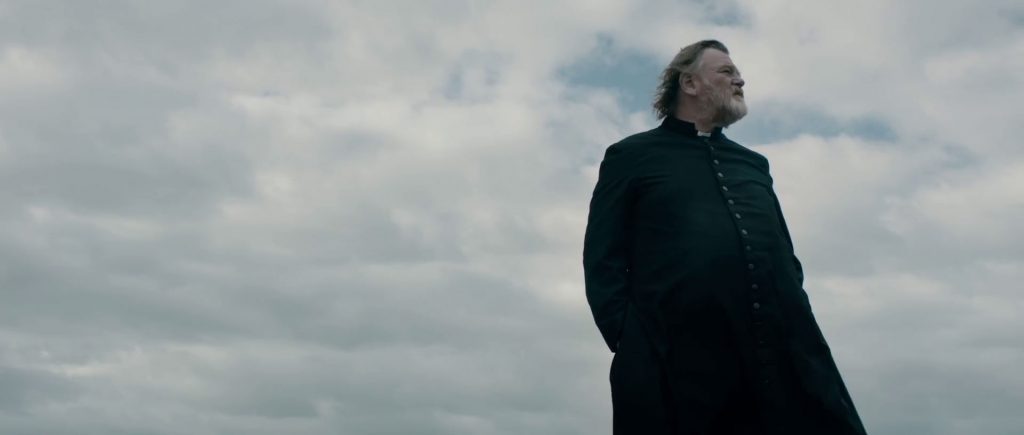The Advent Season presents us with the invitation to slow down, to shear away the clutter and noise of our lives enough to dwell on some of the richest themes in human existence. We can observe how these themes play out in the grand drama of Scripture, as well as in our seemingly mundane lives. I, however, often need a bit of help to get the reflective juices flowing. My preferred contemplative catalysts are films, in part because, as Ingmar Bergman has observed, “No art passes our conscience in the way film does, and goes directly to our feelings, deep down into the dark rooms of our souls.”
So, in the spirit of the season, I would like to invite you to journey with me into a prolonged reflection on four major themes of Advent—Anticipation, Patience, Hope, Revelation— through the stories of four films—The Truman Show (1998), To Kill a Mockingbird (1962), Life is Beautiful (1997), Calvary (2014). I will add a film every week along with 1) a brief summary of the theme and an introduction to the film, and 2) a series of questions intended to prompt a thoughtful viewing and post-viewing discussion. As with most things, these films (and the discussions that follow) are best enjoyed in community (even Covid-sized ones), so I hope your Advent season will be enriched by these stories and the questions they raise for us.
Let us begin:
ANTICIPATION - THE TRUMAN SHOW
Anticipation
On this mountain he will destroy
the shroud that enfolds all peoples,
the sheet that covers all nations
Isaiah 25:7
. . . . .
Cristof: I have given Truman the chance to live a normal life. The world, the place you live in is the sick place. Seahaven is the way the world should be.
Sylvia: He’s not a performer; he’s a prisoner. Look at him; look at what you’ve done to him!
Cristof: He could leave at any time. If his was more than just a vague ambition, if he was absolutely determined to discover the truth, there’s no way we could prevent him. I think what distresses you… is that ultimately Truman prefers his cell, as you call it.
Sylvia: Well that’s where you’re wrong… and he’ll prove you wrong!
. . . . .
Advent, when done right, transports us back in time to a relatively small and unheralded province of the Roman Empire where a people waited. This people had enjoyed millennia of close communion with their God (whether they chose it or not); He had walked with them, spoken to them, and promised for them a coming king and kingdom that would vanquish even death. But for four hundred years this God had fallen largely silent, leaving His people to wait, clinging to fading memories as years rolled by and foreign powers swept over them. So they told stories, stories reminding them of who they were and whose they were, reminding them that their present darkness was a passing vision, eventually bound to give way to eternal dawn. So they waited in anticipation, struggling (sometimes violently) against their perceived reality and towards the promised, un-shrouded reality.
This roiling anticipation is a universal human experience. People throughout history and across the world have found themselves haunted by an unbidden idea that their immediate circumstances do not tell the whole story. There is more to uncover. This deep yearning for a home unknown compels a response, and we have sought a homecoming in every way under the sun: exotic vacations, chemicals, meditation, Bible studies, even suicide vests. Anticipation in this sense is inherently active, unrelenting, and risky, and if you want to see a brilliant portrait of this universal internal reality, look no further than Peter Weir’s 1998 film, The Truman Show.

Truman Burbank lives the stereotype of the White American Suburban life, and for the most part, he loves it. What he doesn’t know is that nothing around him is what it seems: his wife, his friends, his house, his town— all are contained within a massive dome which serves as the studio for the greatest reality television experiment in history, “The Truman Show.” Since before his birth, Truman Burbank (Jim Carrey) has been the star of this show, as well as the only person on the planet who doesn’t know the show exists. The show’s brilliant producer, Cristof (Ed Harris), has spent 30 years keeping Truman completely oblivious to his star status in the hopes of capturing on tape a truly unscripted, normal life. He even expends tremendous creative effort to suppress Truman’s desire to ever leave the fabricated world of Seahaven Island. The story that plays out on film is the fight between Truman’s increasingly restless anticipation of something meaningful beyond his coastal community and Cristof’s attempts from the producer’s box to keep Truman in love with his cell. May the questions that follow enrich your viewing and prompt a thoughtful discussion of this powerful movie.
- What did you like or dislike about this film? Why?
- Do you relate at all to Truman’s yearning for foreign climes? In what context(s) does this yearning become most pronounced? Why is that?
- Are there “cells” we are conditioned to love? If so, is there a way out?
- How might this film change your concept of Advent Anticipation?
- How can a deeper understanding of Anticipation change the way you see and live into the world?
PATIENCE - TO KILL A MOCKINGBIRD
Patience
How long, O LORD? Will you forget me forever?
How long will you hide your face from me?
Psalm 13:1
. . . . .
Miss Maudie Atkinson: Jem.
Jem: Yes, ma’am?
Miss Maudie Atkinson: I don’t know if it will help saying this to you… some men in this world are born to do our unpleasant jobs for us… your father is one of them.
. . . . .
 Among many other things, this season has revealed my impatience. With the help of Wi-Fi & 5G, the iMessage, same-day shipping, and myriad other contributors– I have arrived at a bone-deep sense that the world ought to be at my beck and call. Pandemics remind us that this is never the case. It has taken this extended subjection to hopes and plans deferred to reveal how entrenched my inner-monarch really is.
Among many other things, this season has revealed my impatience. With the help of Wi-Fi & 5G, the iMessage, same-day shipping, and myriad other contributors– I have arrived at a bone-deep sense that the world ought to be at my beck and call. Pandemics remind us that this is never the case. It has taken this extended subjection to hopes and plans deferred to reveal how entrenched my inner-monarch really is.
I’m not the only one to note how impatience pervades our lives and beings– affecting how we desire, treat one another, and think about the world. Nicholas Carr observed in his book The Shallows: What the Internet is Doing to Our Brains, “Whether I’m online or not, my mind now expects to take in information the way the Net distributes it: in a swiftly moving stream of particles.” According to Carr, over time this swift stream erodes our neurological capacity for “deep processing,” the willingness to sit with complex issues (systemic racism, political fragmentation, healthcare ethics, etc.) for extended periods, turning them over in our minds, seeking counterpoints, feeling out nuances.
Thanks to the World Wide Web, we have unprecedented breadth of access to life on this planet, and we are rightly horrified, convicted, and moved by what we find trending. However, it takes much more than access to plumb the depths of these complex issues; it takes intense focus– almost tunnel vision– to ward off the myriad distractions built into most every news platform, not to mention our waning attention spans. Depth of conviction is easily won, easily expressed, and can wield immense social power; depth of understanding is hard-earned, taking years of patient diligence, and even then the measurable outcomes are slow in coming, incremental, proximate. The season of Advent invites us to take a long-view of those things that most grip our souls. It reminds us that injustice’s roots run deeper than we often care to admit (in our societies and ourselves), but also that the Great Uprooting has already begun.
Theologian Stanley Hauerwas describes the season this way, “Advent is patience. It’s how God has made us a people of promise in a world of impatience.” We are impatient, and in a sense we ought to be. There is so much brokenness in the world around us that it’s natural to want to cry out in indignation and defiance. However, without a deep and patient commitment to a cause, it’s likely that all our yelling will only leave us hoarse, burnt out. Patience, in this sense, is not passive but stalwart, focused, and often unpopular.
The character of Atticus Finch (Gregory Peck) from the 1962 classic, To Kill a Mockingbird, offers as compelling a model for this kind of patience as we have in film (and in literature, as well). A small-town Alabama lawyer in the midst of the Great Depression, Atticus is asked to defend Tom Robinson (Brock Peters), a black man, who is accused of raping and assaulting Mayella Ewell (Collin Wilcox Paxton), a white woman. Atticus decides to take the case, knowing full-well that this decision will be very unpopular in certain pockets of the town where deep conviction without the desire for deep understanding holds sway. He knows that this decision could even put his children in harm’s way. And yet, he moves forward, building a strong case he knows has little chance of winning in the local court.
Atticus knows the game is rigged, but instead of resorting to vigilante justice or dissolving into apathy as soon as things became inconvenient, he submits his whole self into the task at hand. Perhaps the most poignant image of Advent Patience in the film comes the night before the trial, when Tom is moved into the local jail. A lynch mob descends on his cell, only to find Atticus sitting calmly in front of it, armed only with the book he was reading. This is what deep conviction looks like embedded in a living pursuit of deep understanding.
- Where did you observe Patience at work in the film?
- What scenes hit “closest to home”?
- Do you know other Atticus-like people, living in a consistent direction over a long period of time?
- How does this framing of patience change the way you approach Advent?
- Where might God be calling you to cultivate a deep understanding and patient commitment?
HOPE - LIFE IS BEAUTIFUL
Hope
Listen! Your watchmen lift up their voices; together they shout for joy. When the LORD returns to Zion, they will see it with their own eyes.
Burst into songs of joy together, you ruins of Jerusalem, for the LORD has comforted his people, he has redeemed Jerusalem.
Isaiah 52:8-9
. . . . .
This is a simple story, but not an easy one to tell.
Like a fable, there is sorrow, and, like a fable,
it is full of wonder and happiness…
 The opening lines of Roberto Benigni’s Academy Award-Winning Life is Beautiful invite us into a world fantastical and recognizable, farcical and grave. For many, it is an uncomfortable tale, and perhaps for that very reason, it is worth a closer look during Advent. This season invites us to dwell upon our “now but not yet” reality, marked by tragedy amidst triumph, laughter amidst tears, and especially this Advent, the choice to be creative within significant constraints. What might we learn from this fable, full of wonder and happiness and sorrow?
The opening lines of Roberto Benigni’s Academy Award-Winning Life is Beautiful invite us into a world fantastical and recognizable, farcical and grave. For many, it is an uncomfortable tale, and perhaps for that very reason, it is worth a closer look during Advent. This season invites us to dwell upon our “now but not yet” reality, marked by tragedy amidst triumph, laughter amidst tears, and especially this Advent, the choice to be creative within significant constraints. What might we learn from this fable, full of wonder and happiness and sorrow?
At first, it truly is “a simple story”: an endearing rascal from the country, Guido (Roberto Benigni), sets out to make a new life for himself in the city, flying headlong into love with the well-to-do and engaged Dora (Nicoletta Braschi). Guido uses every tool in his possession to woo his “Princess,” and two things become clear right away: 1) Guido pays no heed to societal establishments or decorum; 2) his wit is his life-blood.
This first act of the story is a picaresque conquest, so narrowly focused on Guido’s riotous exploits that the broader cultural climate merely serves as fodder for playful subversion. Eventually, though, reality catches up to Guido. It is the height of WWII in Italy, and Guido is Jewish. At this point, he is living a fairy-tale life with Dora and their young son, Joshua (Giorgio Cantarini), until one day, with minimal drama, they are snatched from their home and forced onto trains bound for concentration camps. Joshua is confused and distraught, and you can see Guido’s mind racing, grasping frantically for a way to keep the reality of their situation from his son, to give Joshua not just something to hold onto, but something to live into.
His solution: a game. Making up rules as he goes along, Guido creates a game, complex enough to keep Joshua engaged and simple enough to keep him excited. To many critics, this was seen as an attempt to make comedy out of the Holocaust. And in a real sense, the film does soften the brutality of the camps, since, as Roger Ebert notes, “In the real death camps there would be no role for Guido.” That being said, there are indications in the film that suggest Guido knows just as well as the audience the dire reality of his situation and the extent of his charade. His eyes dart around the solemn faces of the other prisoners as he crafts fanciful stories about his day to Joshua, trying as hard as he can to remain upbeat.
One night, carrying a sleeping Joshua home after his most triumphant subversion since arriving in the camp, Guido literally comes face-to-face with the mountain of horror in which he is living. In one of the best uses of the “reaction shot” I know of, we see the reality of the camp cut through Guido as he confronts it. Slowly backing away, clutching Joshua, there are no jokes, no tricks. Through this scene, I think it is possible to read the rest of Guido’s actions, imperfect and dishonest as they are; as Ebert puts it, “Guido uses the only gift at his command to protect his son. If he had a gun, he would shoot at the fascists. If he had an army, he would destroy them. He is a clown, and comedy is his weapon.”
And yet, the film goes on, and we are forced to ask: How can Guido go back to living after experiencing such profound darkness?
“For the first time in my life I saw the truth as it is set into song by so many poets, proclaimed as the final wisdom by so many thinkers… The salvation of man is through love and in love. I understood how a man who has nothing left in this world still may know bliss… in the contemplation of his beloved…
Man is never driven to moral behavior; in each instance he decides to behave morally. Man does not do so in order to satisfy a moral drive and to have a good conscience; he does so for the sake of a cause to which he commits himself, or for a person whom he loves, or for the sake of his God.”
In Man’s Search for Meaning, Viktor Frankl, an Austrian psychiatrist, examines his own imprisonment in a concentration camp during WWII, searching for that which can sustain a person’s spirit through the worst of circumstances. He finds that our resilience and joy flow from an orientation of our minds and lives towards a “beloved,” be it a cause, person, or God. The higher the beloved, the more buoyant the spirit. Most men in the concentration camp with Frankl were forced to contemplate their beloved abstractly, but Guido’s beloved was embodied in the life and spirit of his son. He committed his whole self to Joshua’s preservation, enabling him to rescue “whatever is good and hopeful from the wreckage of dreams,” to quote Ebert once again.
Advent allows us the opportunity to remember that you and I have been called “Beloved” by One so committed to our preservation that He endured the worst the world (and beyond) could inflict, so that we might be free to run into the embrace of our Creator.
- Where did you observe the power and limits of Hope at work in the film?
- What role does beauty play in this film?
- How might Guido’s creative subversions within confinement shape how we view this Pandmic?
- How might the arrival of our Beloved on Christmas change how we move through this Advent?
REVELATION - CALVARY
Revelation
“Woe to me!” I cried. “I am ruined! For I am a man of unclean lips, and I live among a people of unclean lips, and my eyes have seen the King, the Lord Almighty.”
Then one of the seraphim flew to me with a live coal in his hand, which he had taken with tongs from the altar. With it he touched my mouth and said, “See, this has touched your lips; your guilt is taken away and your sin atoned for.”
Then I heard the voice of the Lord saying, “Whom shall I send? And who will go for us?”
And I said, “Here am I. Send me!”
Isaiah 6: 5-8
. . . . .
Teresa: Have you performed the last rites many times?
Fr. James: Yes. Usually with older people, of course. They have time to prepare for it. Everybody knows it’s coming.
Teresa: It is easier?
Fr. James: It’s never easy. More understandable, I’d say.
Teresa: Less unfair.
Fr. James: In situations like this one, people are shocked. The randomness of it. They curse God. They curse their fellow man. They lose their faith in some cases.
Teresa: They lose their faith? It must not have been much of a faith to begin with.

“In this world you will have trouble…”
We have become reacquainted with this ever-present truth in 2020. The storms this year has brought– storms of a pandemic, a racial reckoning, and a highly contentious election (and post-election)– have taken us through a cyclone of emotions: fear, compassion, shock, protest, anguish, bitterness, judgment, guilt, and on and on and on. How can we muster up the spirit to lean into this broken world day after day?
Like Truman Burbank, we sense that deep down, something is amiss in our world, and (when we’re honest) in ourselves as well. We remain shocked that our society doesn’t simply get better as we become more cultured, civilized, educated. But can we apply that same logic to ourselves? Do I gain integrity the more I learn about the world? In fact, I find quite the opposite. If I am more generous, I am also more calculating; if more self-controlled, more callous; if less wrathful, more sarcastic. Perhaps I no longer swing a broadsword in conflict, but I have grown quite accurate with darts.
We can also look beyond our own lives to uncover the untruth inherent in the philosophy of progress: sophisticated medical experiments performed on concentration camp prisoners by M.D.’s, terrorist organizations with graphic design teams, the sexual abuse of children by clerics, and so many more. How do we bear up upon becoming aware of, or even suffering from, these tragedies?
This question is very much at the heart of John Michael Donagh’s haunting film, Calvary. Father James (Brendan Gleeson), a stolid Irish Catholic priest has chosen a simple life serving a parish in a remote coastal village, only his dog and a crucifix to his name. Taking confession one day, an unknown man confesses to having been violently molested by a priest when he was a boy. The Church’s betrayal of his innocence seared into the man a fatal cynicism, which he expresses by declaring that in seven days, he is going to kill a good priest– Fr. James. The man leaves, and the rest of the film follows Fr. James attempting to navigate with integrity a world brimming with bitterness towards his office. Like real life, we see the full spectrum of human responses to the painful realities of this world, and slowly Fr. James comes to grips with the deep human cost of his institution’s failure to steward faithfully their vocations, both in the acts of abuse and in the subsequent cover-ups. While peppered with dry british humor, it remains mostly a dark journey that earns its R-rating.
Fr. James’ struggle resonates deeply with the Advent theme of Revelation. We are called to be salt and light to the earth, carrying the good news of the coming Kingdom of God to the broken parts of the world; we are also deeply flawed and rarely even able to carry out our own will, let alone God’s. What does faithfulness look like in light of this pervasive tension? Calvary offers one vision for what that might look like, but like a parable of Jesus, it leaves us with more questions than answers. We must then, like Fr. James, move humbly forward within the reality of Advent and Christmas and Good Friday and Easter:
“…But take heart! I have overcome the world.”
- What are the traits that define Father James as a character?
- What does this film have to say about culpability? Who is to blame for what transpires?
- Should we be accountable for the sins of those who came before us? How does this film answer that question?
- What does this film have to say about our role in the revelation of God’s Kingdom on earth?
- Is this film a better fit for Advent or Good Friday? Why or why not?
